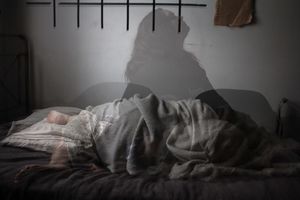Sleep Disorders In Stroke: Difference between revisions
Candace Goh (talk | contribs) No edit summary |
Candace Goh (talk | contribs) No edit summary |
||
| Line 5: | Line 5: | ||
</div> | </div> | ||
== Introduction == | == Introduction == | ||
[[File:Sleep disorder 2.jpg| | [[File:Sleep disorder 2.jpg|thumb]] | ||
[https://www.physio-pedia.com/Sleep_Deprivation_and_Sleep_Disorders Sleep disorders] represent a common yet often overlooked aspect of stroke care, significantly impacting an individual's physical and cognitive well-being. In stroke rehabilitation, understanding and addressing sleep disorders are crucial for optimising recovery outcomes. Sleep disorders serve significant functions as both a risk element and a determinant in the recovery and prognosis of stroke.<ref>Hermann DM, Bassetti CL. [https://www.neurology.org/doi/full/10.1212/WNL.0000000000003037 Role of sleep-disordered breathing and sleep-wake disturbances for stroke and stroke recovery]. Neurology. 2016 Sep 27;87(13):1407-16.</ref> | [https://www.physio-pedia.com/Sleep_Deprivation_and_Sleep_Disorders Sleep disorders] represent a common yet often overlooked aspect of stroke care, significantly impacting an individual's physical and cognitive well-being. In stroke rehabilitation, understanding and addressing sleep disorders are crucial for optimising recovery outcomes. Sleep disorders serve significant functions as both a risk element and a determinant in the recovery and prognosis of stroke.<ref>Hermann DM, Bassetti CL. [https://www.neurology.org/doi/full/10.1212/WNL.0000000000003037 Role of sleep-disordered breathing and sleep-wake disturbances for stroke and stroke recovery]. Neurology. 2016 Sep 27;87(13):1407-16.</ref> | ||
Revision as of 17:53, 30 March 2024
Original Editor - Candace Goh
Top Contributors - Candace Goh
Introduction[edit | edit source]
Sleep disorders represent a common yet often overlooked aspect of stroke care, significantly impacting an individual's physical and cognitive well-being. In stroke rehabilitation, understanding and addressing sleep disorders are crucial for optimising recovery outcomes. Sleep disorders serve significant functions as both a risk element and a determinant in the recovery and prognosis of stroke.[1]
Prevalence of Sleep Disorders in Stroke[edit | edit source]
Sleep disturbances are highly prevalent among stroke survivors, with studies reporting rates ranging from 40% to 72%.[2][3] Females have a higher risk compared to males, as do those with higher stroke severity. Common sleep disorders observed in this population include insomnia, obstructive sleep apnea (OSA), restless legs syndrome (RLS), and sleep-related movement disorders.[4] The presence of these disorders not only affects sleep quality but also exacerbates stroke-related impairments and complicates the rehabilitation process.
Sub Heading 3[edit | edit source]
Resources[edit | edit source]
- bulleted list
- x
or
- numbered list
- x
References[edit | edit source]
- ↑ Hermann DM, Bassetti CL. Role of sleep-disordered breathing and sleep-wake disturbances for stroke and stroke recovery. Neurology. 2016 Sep 27;87(13):1407-16.
- ↑ Mohandas P, Alomari Z, Arti FN, Alhneif M, Ruiz PA, Ahmed AK, Wei CR, Amin A, Kukreja A, Alrahahleh AA. A Systematic Review and Meta-Analysis on the Identification of Predictors Associated With Insomnia or Sleep Disturbance in Post-stroke Patients. Cureus. 2024 Mar 20;16(3).
- ↑ Hasan F, Gordon C, Wu D, Huang HC, Yuliana LT, Susatia B, Marta OF, Chiu HY. Dynamic prevalence of sleep disorders following stroke or transient ischemic attack. Stroke. 2021.
- ↑ Cai H, Wang XP, Yang GY. Sleep Disorders in Stroke: An Update on Management. Aging and disease. 2021;12(2):570.







